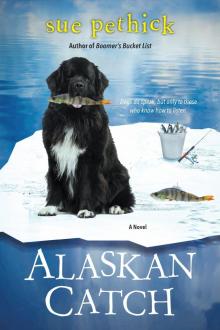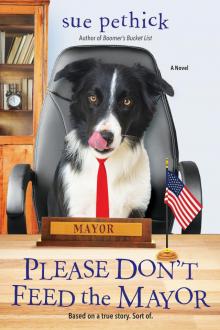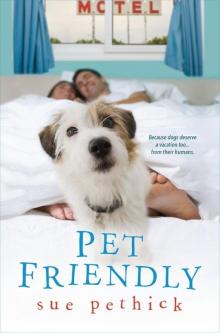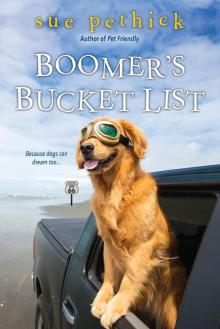- Home
- Sue Pethick
Please Don't Feed the Mayor Page 11
Please Don't Feed the Mayor Read online
Page 11
“You see that?” Bryce said. “He’s totally cool with it.”
“All right,” she said doubtfully. “I guess it wouldn’t hurt.”
* * *
The two of them dropped Melanie off at Ground Central and headed to the next house on the map. In spite of his experience the day before, Bryce was eager to take Shep out again. So far, his plan to win Melanie over wasn’t working as well as he’d intended; he hoped he’d have better luck with her dog. If he could prove to her that the two of them could get along, it would be that much easier to convince her that the three of them could live peacefully together in Portland.
The next house on the map was in Fossett’s historic district, only a few blocks from the B and B where Bryce was staying. Like Fossett House, it had been built in the Victorian style with dormers, exposed trusses, and Gothic windows. But whereas the B and B had been painted in muted tones of yellows and cream, this house was purple, with dark green shutters and bright yellow scrollwork running along the eaves. A gazing ball sat in the front yard and twin dream catchers dangled on either side of the porch. A brass nameplate on the door said: JEWELL DIVINE, PET PSYCHIC.
“Well, this should be interesting,” Bryce said as he rang the bell.
Moments later, the door swept open and a slender woman in a gold turban and a velvet caftan opened the door. The interior of the house looked like two parts haunted house and one part Hoarders.
“Hello,” Bryce said. “I’m Bryce MacDonald and this is Shep. He’s running for mayor—”
Jewell gave them an enigmatic smile.
“I know. I’ve been expecting you.”
She held her hands out to the dog.
“Shep, my dear. How are you?”
The collie stepped closer and she cupped her hands around his head. Several seconds passed while she and the dog communed.
Bryce looked around.
“Right. Well, we, uh—”
“Sh-sh-sh.” The psychic held up her hand. “Please don’t interrupt.”
He checked his watch, feeling like a fool standing there. How long was this going to take?
“He’s running for mayor,” he whispered.
“I know.” Jewell frowned. “Be quiet, please.”
Several awkward moments passed while Bryce cooled his heels. At last, the psychic let go of Shep and stood.
Not a moment too soon.
“So, the election is this Saturday,” Bryce said. “Shep is really hoping he can count on your vote.”
“Yes, of course,” Jewell said absently, tapping her chin. “But I must warn you, there is a scandal in his past which you must deal with quickly or it will ruin his time in office.”
Bryce nodded as if giving it some serious thought. He’d always made it a point not to argue with crazy people.
“Well, that’s good to know, isn’t it?” He looked at Shep. “Remember that. Honesty is the best policy.”
Jewell was eyeing him critically.
“And he has a lesson for you,” she said. “But Shep tells me you are a slow learner.”
“Right. Aaaaanyway,” Bryce said. “Thanks for the heads-up. I’ll make sure we get that whole scandal thing cleared up right away.”
Jewell folded her arms, looking pleased.
“Good. I look forward to the celebration.”
As the two of them walked back out to the curb, Bryce glanced down at Shep.
“What do you mean I’m a slow learner?”
The next few houses were scattered among the numbered streets along the periphery of downtown. After the delay at Jewell’s the two of them were once again making good time. For the most part, people were polite and enthusiastic about Shep’s candidacy. Only a few mentioned being visited by Rod Blakely, and of those who did, no one had anything good to say about the experience. “The man can’t take yes for an answer,” was a common refrain. With only two houses to go, there were twenty yeses, five undecideds, and one firm no on the tally sheet and ten dollars (eight tired-looking singles, seven quarters, two dimes, and a nickel) and a Toll House cookie (delicious) in donations. Not a bad haul, Bryce thought. Melanie would be pleased.
Melanie would also be pleased, he thought, about how well he and Shep had been getting along—surprising, really, considering how badly things had gone the day before. Maybe having Bryce carry him out of the woods had caused the dog to have a change of heart.
They’d come almost full circle by then. Melanie’s car was little more than a block away. The sun was still out, but low enough in the sky that it barely skimmed the tops of the trees; he could feel the temperature dropping. At the thought of getting back inside the car, his pace quickened.
They were coming up on Lou Tsimiak’s house. The place was even stranger in person than Melanie had described it. The yard was a hodgepodge of odds and ends that the man must have been collecting for years. Birdbaths, metal sculptures, and lawn trolls sat amid stacks of flat tires, broken lawn furniture, and two-liter bottles, filled with sand and half buried in the ground, all of it overgrown with weeds and wild blackberry. Whether it was PTSD or some other mental condition that had prompted this cache, Bryce was glad he didn’t have to deal with it.
He felt a tug on the leash. Shep was trying to head toward the front door.
“No, no. We’re not going in there,” he said.
The collie glanced back over his shoulder, then tugged again.
“No,” Bryce said, pulling firmly on the lead. “Not here. Come on.”
Shep turned around, then sat down and stared at him defiantly.
“I don’t believe this,” Bryce muttered. “Shep,” he said, giving the leash a tug. “Heel.”
When the dog didn’t budge, he tightened his grip and tried again.
“I said, heel.”
The collie stood, made a feint in his direction, and grabbed the lead in his mouth.
“What are you doing?” Bryce said. “Let go of that!”
Before he knew it, Shep had dug all four paws into the ground and started jerking on the lead, throwing his entire weight into the effort as Bryce held fast to the other end. The two of them were literally in a tug-of-war.
Bryce gritted his teeth. If Shep got away with this sort of bad behavior again, there was no chance that the two of them would ever be able to get along and any hope he had of convincing Melanie to move in with him would be gone.
Well, he thought, that wasn’t going to happen. The collie was headstrong and spoiled and it was time he learned that he was not the one in charge.
“Drop it, Shep,” he said, preparing for a final pull. “I said drop. It!”
And Shep did drop it. As Bryce put all his strength into one final yank of the lead, the collie stepped forward. With nothing to resist his backward motion, Bryce lost his balance and toppled into the bushes.
“What the hell was that all about?” he said, flailing his arms as he tried to right himself. “I swear, Shep, when we get back to the shop—Ow!”
He knew what had happened the second he felt it. Bryce swatted at his neck and got another sting for his trouble before the hornet flew off. He sat up and shook his head, feeling panic clutch at his chest. There was antivenom in the glove box of his own car, but he hadn’t thought to put it in Melanie’s and they were blocks away from Pete’s garage. Even if he sprinted, he’d never get there in time.
He felt faint—his blood pressure was beginning to drop—and his tongue began to tingle. As his throat began to swell, he was finding it harder to breathe. Bryce began to feel an odd detachment from the world, realizing that he was about to die. Shep, too, must have known that something was wrong, he thought. The collie was barking frantically.
Then everything went black.
CHAPTER 14
Bryce didn’t know how long he’d been unconscious. For the first few minutes after coming to, in fact, he wasn’t even sure he was alive. The last thing he could remember was standing outside and feeling at peace as darkness swallowed him. Who had found
him and how he’d gotten there—wherever he was—was a mystery.
There was an ache in his thigh and his whole body was buzzing, as though a current of electricity had been plugged into his nervous system. Bryce thought he might have jumped out of his skin if it weren’t for the heavy blanket that covered him, pressing down like a giant hand. He smelled incense burning. Somewhere in another room, a man was talking. He licked his lips, trying to relieve the parched feeling in his mouth, and lifted his head.
He was lying on a bed in the middle of a room he’d never seen before. On the nightstand next to him was a glass of water, a thermometer, and an odd-looking incense burner from which a wisp of fragrant smoke was rising. A small desk and chair on the opposite wall were the only other pieces of furniture. The rest of the room was filled with Native American artwork: a woodcut of a bald eagle soaring over treetops; masks that looked like bears, beavers, and wolves; a coat made out of feathers. Shelves on two of the walls held more treasures: tiny carved figures in native dress, pots woven from prairie grass, a peace pipe, and, incongruously, a small shadow box with six military service ribbons.
The conversation in the other room stopped and Bryce heard footsteps coming closer. He laid his head back down just as a barrel-chested man in a T-shirt and jeans walked in. The man had a broad, flat face and a square jaw that suggested belligerence, but the deep-set eyes were kind, with creases that fanned out across his cheekbones like wing feathers. His long black hair, shot through with wiry strands of white, reached well past his shoulders.
“So,” he said. “You’re awake.”
“Yes, thanks to you. You’re Lou Tsimiak.”
“Yep, that’s me.”
“How did—”
Bryce coughed. His throat was so dry it was hard to talk.
“Here.”
The man slid an arm under his back, lifted him gently, and held the glass of water to his lips. Bryce took a few grateful swallows and lay back on the bed.
“Thank you,” he said. “How’d you find me?”
Tsimiak looked at him as if the answer were obvious.
“Wolf called me. I answered.”
Bryce shook his head. Was this some sort of Indian thing?
“Wolf,” the man said again, pointing at the floor.
He raised himself on one elbow and peered over the side of the bed. Shep was lying next to the bed, looking remorseful.
“When I brought you inside, Wolf came, too. He’s been sitting vigil, waiting for you to wake up.”
Bryce fell back against the pillow.
“Well, I suppose it’s the least he could do, considering he nearly killed me.”
He looked around at all the Indian paraphernalia.
“This is some collection you’ve got in here.”
Tsimiak walked over to the desk and removed a small box from the top drawer. He glanced at the artifacts and nodded curtly.
“It was my therapist’s idea. After what happened over there . . .”
He shook his head.
“Didn’t know who I was: a warrior or just the White Man’s tool? She’d heard of a Chinook holy man who had good luck working with vets suffering from PTSD. I did the whole sweat lodge thing, grew my hair out—it felt like I was getting my spirituality back. These things you see here make me feel connected to all of that.”
“So, did you find your answer?”
Tsimiak closed the drawer and took a few seconds to consider.
“Still working on it, I guess.”
Bryce nodded toward the badge and service ribbons in the shadow box. As the son of a military man, he was familiar with their meanings: Afghan campaign, Global War on Terrorism Expeditionary Medal with a V for valorous conduct, Purple Heart, Bronze Star, a Distinguished Marksman Badge.
“Looks like you had a pretty distinguished military career.”
Tsimiak shrugged.
“I did what I had to do.”
“Sorry,” Bryce said. “I didn’t mean to bring up a sore subject.”
The man turned and looked at him.
“Some Indians don’t believe in military power. They think guys like me are being exploited by the government, but I don’t feel that way. The Marines didn’t make me a warrior; they just gave me a place to use the skills I already had. Now that I’ve mustered out, I still perform the rituals of a warrior—rise at dawn, say my prayers, maintain my weapons, exercise my mind and body—but a warrior without a war is just a man that other men fear. If I’m not a warrior, what am I here for?”
He sighed.
“Maybe when I find that answer, I’ll be at peace.”
Bryce turned his head and took a closer look at the incense burner. It was shaped like a man draped in buffalo robes, with two feathers in his hair. He held a pipe in one hand and his chin was held high. Smoke from the incense rose from his mouth.
“Who’s this guy?”
“A Kiowa holy man. The smoke he exhales is supposed to have healing powers. After I went through the sweat lodge ceremony, I spent some time studying native healing.”
“Did you use some kind of Native American medicine on me?”
Tsimiak nodded solemnly.
“It called EpiPen.”
He laughed out loud.
“Just messing with you, dude. Sorry. A little Indian humor there.”
Bryce chuckled.
“No, it’s okay. I probably deserved that.”
Tsimiak opened the box and set it on the nightstand.
“I’m gonna check your blood pressure while we wait for the doc to arrive.”
He took Bryce’s arm out from under the blanket and wrapped it in a cuff.
“Melanie tells me you’re a Luckiamute. Is that true?”
“Depends on who you ask. You ask me, I say yes. You ask the tribes around here, they’d say no.”
“Why’s that?”
Tsimiak started pumping up the cuff.
“White women. Too many of my ancestors married them. Besides, the BIA folded the Luckiamute tribe into the Grande Ronde years ago.”
“If you’ll forgive me for saying so, you look like an Indian to me.”
“Hey, no offense taken, man. Some people pay through the nose for this kind of bronze beauty.” He lifted his chin and struck a pose. “Eat your heart out, paleface.”
Bryce laughed. He was starting to like this guy.
“So, I guess there’s no chance you’d be welcome on a reservation.”
The man waved the thought away.
“Who needs ’em? My people lived right here for thousands of years before white men came. If I want to feel close to them, all I have to do is take a walk in the woods. Now that the loggers are gone, the land can finally recover. Soon, the trees and the animals who depend on them will return. No,” he said. “This is where I belong; not running a craps table at some casino.”
In spite of the man’s flippant attitude, Bryce sensed there was real hurt there. It seemed to him that Lou Tsimiak was caught between two worlds.
The Indian checked his blood pressure reading and took off the cuff.
“Getting better,” he said, stuffing it back into the box. “You still feel like you got ants crawling under your skin?”
Bryce nodded. “About a million of ’em.”
“Yeah, adrenaline will do that to you—fight or flight. Beats dying, though.”
A furry head poked up over the covers and Bryce felt Shep snuffling his exposed hand.
Tsimiak grinned.
“Looks like someone’s sorry.”
Bryce hesitated a second, still irked at the collie for dumping him into the bushes. Nevertheless, when he looked into the eyes staring pleadingly up at him, he couldn’t resist.
“Oh, all right.”
He stroked the dog’s head and received a grateful lick in return.
“I guess I shouldn’t be too angry,” he said. “After all, you did call for help.”
Tsimiak stood and stretched.
“You’re gonna fee
l like crap for the next day or so. See if the doctor will give you something to help you sleep. Also, the place on your thigh where I injected you will be tender; you’ll probably have a nasty bruise.”
Bryce heard knocking on the front door downstairs. Tsimiak put the cuff away and smiled.
“Sounds like the cavalry’s arrived.”
CHAPTER 15
Melanie sat on the edge of the bed, watching Bryce with concern. She’d come home to see how he was doing and found him having another one of his “spells.” The doctor had given him a sedative last night to help counteract the jumpiness and anxiety caused by the EpiPen, and within minutes of Melanie getting him to her house he’d fallen into an exhausted sleep. Not long afterward, though, he’d begun tossing his head and moaning as if engaged in some sort of struggle. As she sat there, watching him twitch and grimace, she almost wished she’d asked the doctor to give her something to relieve her own anxiety. What, she wondered, was going on behind those closed eyes?
The first time it happened, she’d called the doctor in a panic, sure that Bryce was having some sort of seizure, but he’d assured her that it was a normal, if somewhat uncommon, reaction. The sudden loss of blood pressure, followed by an equally sudden jolt of epinephrine, had been a shock to both his brain and body, and although the sedative made it possible for him to sleep, it couldn’t counteract what he’d already endured. Whether these spells were the reflex reactions of an overstimulated nervous system or the physical manifestations of some mental trauma was unknowable at this point, he told her. The best thing to do was to keep Bryce quiet and comfortable.
Melanie reached out and laid a hand on his damp forehead. To check for a fever, she told herself, but what she was really seeking was reassurance. Try as she might, she couldn’t keep from obsessing about what might have happened. What if Lou hadn’t found him when he did, or hadn’t had an injector on hand, or if Shep’s barking hadn’t alerted him that something was wrong? The thought that she might have lost Bryce forever made her feel sick at heart.
As the spell passed, beads of sweat began to form on Bryce’s upper lip. With a guilty pang, Melanie realized she’d probably put too many covers on him. The doctor had warned her that his temperature might fluctuate until the epinephrine was out of his system, and she’d been anxious to get him warmed up quickly. Her little bungalow lacked the sort of modern insulation that newer houses had and when she and Lou had gotten Bryce into bed last night, there’d been a definite chill in the room. Perhaps, she thought, she’d overdone it a little.

 Alaskan Catch
Alaskan Catch Please Don't Feed the Mayor
Please Don't Feed the Mayor Pet Friendly
Pet Friendly The Dog Who Came for Christmas
The Dog Who Came for Christmas Boomer's Bucket List
Boomer's Bucket List